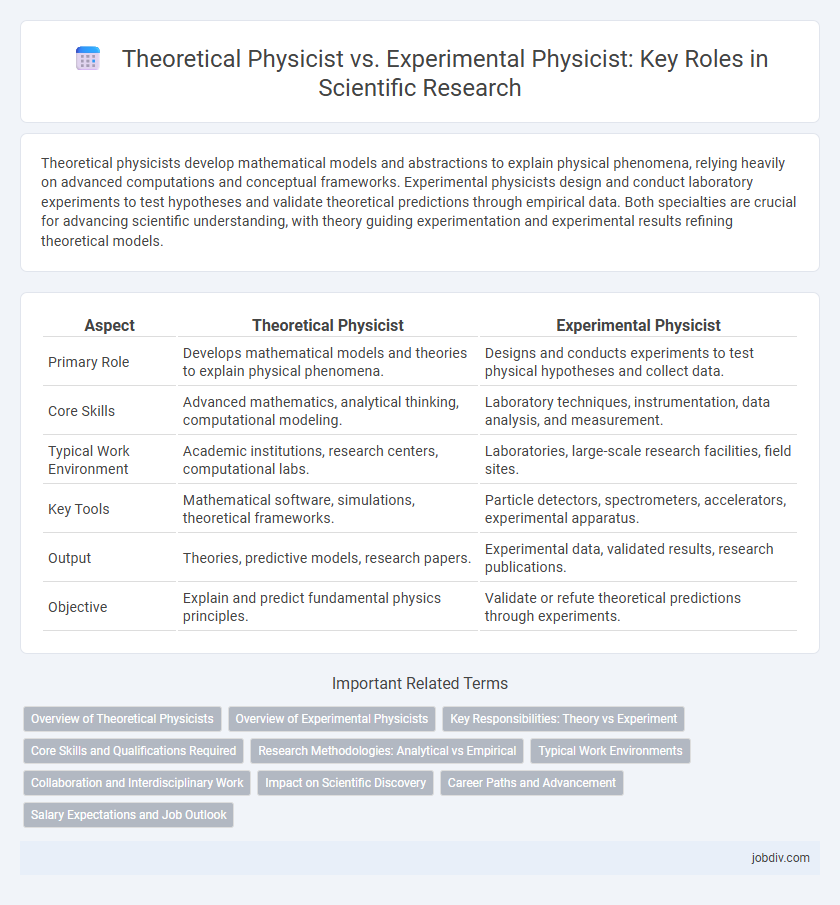Theoretical physicists develop mathematical models and abstractions to explain physical phenomena, relying heavily on advanced computations and conceptual frameworks. Experimental physicists design and conduct laboratory experiments to test hypotheses and validate theoretical predictions through empirical data. Both specialties are crucial for advancing scientific understanding, with theory guiding experimentation and experimental results refining theoretical models.
Table of Comparison
| Aspect | Theoretical Physicist | Experimental Physicist |
|---|---|---|
| Primary Role | Develops mathematical models and theories to explain physical phenomena. | Designs and conducts experiments to test physical hypotheses and collect data. |
| Core Skills | Advanced mathematics, analytical thinking, computational modeling. | Laboratory techniques, instrumentation, data analysis, and measurement. |
| Typical Work Environment | Academic institutions, research centers, computational labs. | Laboratories, large-scale research facilities, field sites. |
| Key Tools | Mathematical software, simulations, theoretical frameworks. | Particle detectors, spectrometers, accelerators, experimental apparatus. |
| Output | Theories, predictive models, research papers. | Experimental data, validated results, research publications. |
| Objective | Explain and predict fundamental physics principles. | Validate or refute theoretical predictions through experiments. |
Overview of Theoretical Physicists
Theoretical physicists develop mathematical models and abstractions to explain physical phenomena, focusing on formulating hypotheses and predicting new effects that can be tested experimentally. They employ advanced calculus, quantum mechanics, and computational simulations to explore the fundamental laws of nature, often addressing questions about the universe's origin, particle interactions, and field theories. Their work underpins experimental physics by providing frameworks that guide empirical investigations and interpret experimental data.
Overview of Experimental Physicists
Experimental physicists design and conduct laboratory experiments to test hypotheses and validate theoretical models in physics, utilizing advanced instruments such as particle accelerators, spectrometers, and cryogenic systems. They analyze empirical data to explore phenomena in condensed matter, quantum mechanics, or astrophysics, often collaborating with interdisciplinary teams to develop innovative technologies. Their work bridges theory and practical application, providing critical insights that drive technological advances and deepen understanding of physical laws.
Key Responsibilities: Theory vs Experiment
Theoretical physicists develop mathematical models and abstract concepts to explain fundamental physical phenomena, focusing on hypothesis formulation and predictive simulations. Experimental physicists design and conduct controlled experiments to test theories, gather empirical data, and validate or refute theoretical predictions through precise measurements. Both roles are integral to advancing scientific knowledge, with theory guiding experimentation and experimental results refining theoretical frameworks.
Core Skills and Qualifications Required
Theoretical physicists require strong mathematical proficiency, abstract reasoning, and expertise in advanced concepts such as quantum mechanics and general relativity to develop models explaining physical phenomena. Experimental physicists need skills in designing and conducting experiments, precision measurement, data analysis, and proficiency with laboratory equipment and instrumentation. Both roles demand a solid foundation in physics principles, critical thinking, and often a Ph.D. for research positions.
Research Methodologies: Analytical vs Empirical
Theoretical physicists employ analytical research methodologies, developing mathematical models and simulations to predict physical phenomena and derive fundamental laws of nature. Experimental physicists utilize empirical approaches, designing and conducting experiments to observe, measure, and validate theoretical predictions through precise data collection and analysis. The interplay between theoretical models and empirical evidence drives scientific progress, ensuring that hypotheses are rigorously tested and refined.
Typical Work Environments
Theoretical physicists primarily work in academic institutions, research centers, or universities, relying on computer simulations and mathematical models to develop frameworks that explain physical phenomena. Experimental physicists mainly operate in laboratory settings or specialized facilities equipped with advanced instruments to conduct hands-on experiments and gather empirical data. Both roles often collaborate in interdisciplinary environments, contributing complementary insights to the advancement of physics research.
Collaboration and Interdisciplinary Work
The collaboration between theoretical physicists and experimental physicists drives scientific breakthroughs by integrating mathematical models with empirical data. Interdisciplinary work often involves joint projects where theoretical predictions guide experiments, while experimental results refine theoretical frameworks, enhancing accuracy in fields like quantum mechanics and particle physics. This synergy facilitates innovation, enabling advancements in understanding fundamental forces and developing novel technologies.
Impact on Scientific Discovery
Theoretical physicists develop mathematical models and hypotheses that predict phenomena beyond current experimental reach, laying foundational frameworks for future research. Experimental physicists design and perform experiments to test these theories, providing empirical data that validate or refute theoretical predictions. The interplay between theoretical insights and experimental verification accelerates scientific discovery, enabling breakthroughs such as the confirmation of the Higgs boson and advancements in quantum mechanics.
Career Paths and Advancement
Theoretical physicists often advance through contributions to fundamental theories and mathematical models, frequently securing positions in academia or research institutions where publishing influential papers is critical. Experimental physicists progress by designing and conducting experiments that validate theories, with career growth often linked to the development of innovative methodologies and collaborations in large-scale research facilities. Both career paths demand continuous learning and specialization, but experimental physicists may experience more hands-on opportunities in laboratory settings, while theoreticians engage deeply with abstract problem-solving and computational simulations.
Salary Expectations and Job Outlook
Theoretical physicists typically earn a median salary ranging from $80,000 to $120,000 annually, driven by academic and research institutions, while experimental physicists often command higher salaries averaging $90,000 to $130,000 due to roles in laboratories, government agencies, and private industries. Job outlook for both professions remains steady, with demand fueled by advancements in quantum computing, renewable energy, and particle physics research. Experimental physicists experience slightly higher employment growth, reflecting increased investment in practical applications and technology development.
Theoretical Physicist vs Experimental Physicist Infographic

 jobdiv.com
jobdiv.com